Suchergebnisse
Energiemosaik Austria - Österreichweite Modellierung und webbasierte Visualisierung von Energieverbrauch und CO2-Emissionen auf Gemeindeebene
Inhalt des Projektes ist eine alle Nutzungs- und Mobilitätsarten umfassende Modellierung und webbasierte Visualisierung von Energieverbrauch und Treibhausgasemissionen aller österreichischen Gemeinden. Die Ergebnisse können in zahlreiche energie- und klimarelevante Handlungsfelder integriert und für die Sensibilisierung von Entscheidungsträgern und Öffentlichkeit genutzt werden.
greenWATERrecycling - Thermische & stoffliche Grauwassernutzung zur klimatisch wirksamen Gebäudebegrünung und erneuerbaren Warmwasserbereitung
Entwicklung eines Systems zur stofflichen und thermisch-energietechnischen Grauwasserfiltratsverwertung zur Bewässerung von Gebäude- und Fassadenbegrünungen zur Reduktion des Energieverbrauchs der Warmwasserbereitstellung und des Wasserverbrauchs von Begrünungssystemen.
greenWATERrecycling – utilization of greywater for energy recovery and for providing greywater-filtrate for watering green walls
Development of a system for energy-recovery of waste heat of greywater and of greywater-filtrate in ordert o reduce the energy consumption of hot water supply and the water consumption for irrigation.
SmartCity Baumgarten - Demonstration eines Anergienetzes und Umsetzung von klimafitten Lösungen im Bestandsquartier
Umsetzung eines liegenschaftsübergreifenden Anergienetzes zur Versorgung mit Wärme, Kälte und Strom in einem Bestandsquartier. Mit diesem Demonstrationsprojekt wird eine technisch-rechtliche Alternative für Gebiete außerhalb von Fernwärmeversorgung entwickelt, die es ermöglicht, dass sich Nachbarschaften zusammenzuschließen um erneuerbare Energien gemeinsam zu nutzen.
SmartCity Baumgarten - Demonstration of an anergy network and implementation of climate-friendly solutions in existing districts
Implementation of a cross-property anergy network for the supply of heating, cooling and electricity in an existing neighbourhood. With this demonstration project, a technical-legal alternative for areas outside of district heating supply is developed, which makes it possible for neighbourhoods to join together to use renewable energies in common.
RENOWAVE.AT - The innovation lab for sustainable, climate-neutral renovation of buildings and districts
RENOWAVE.AT will act as a central contact point for collaboration in innovation projects and provide systematic and early access to as well as promote innovative, scalable renovation concepts and sustainable renovation technologies within real development environments (open innovation principle).
Grüne und resiliente Stadt - Steuerungs- und Planungsinstrumente für eine klimasensible Stadtentwicklung
Ziel des Projekts war ein „Proof of Concept“ eines Regelkreises und Tool-Sets zur Steuerung, Optimierung und Evaluierung einer grünen und klimasensiblen Stadt(teil)planung bestehend aus städtebaulichen und freiraumplanerischen Instrumenten sowie Klimasimulationen auf unterschiedlichen Maßstabsebene.
Monitoring Mehrfamilienhäuser "Tonpfeifengasse"
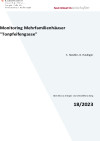
Messtechnische Begleitung und Bewertung der Funktionsweise von Bauteilaktivierung als Speicher für Umweltenergien am Beispiel der Wohnhausanlage Tonpfeiffengasse.
Schriftenreihe
18/2023
S. Handler, G. Haslinger
Herausgeber: BMK
Deutsch, 72 Seiten
Downloads zur Publikation
Weiterführende Untersuchungen und Monitoring der grünen Wände am GRG7 Kandlgasse
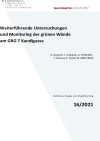
Anknüpfend an das abgeschlossene Forschungsprojekt „GrünPlusSchule“, in dessen Rahmen verschiedene Begrünungsmaßnahmen an und in einer Schule im 7. Wiener Gemeindebezirk (GRG7) umgesetzt werden konnten, greift das vorliegende Folgeprojekt weitere offene Fragen auf und widmet sich detaillierten Messdatenauswertungen zu den Auswirkungen der Innen- sowie Außenbegrünungen.
Schriftenreihe
16/2021
A. Korjenic, J. Hollands, A. Pichlhöfer, T. Gonaus, E. Sesto, M. Mitterböck
Herausgeber: BMK
Deutsch, 98 Seiten
Downloads zur Publikation
Digitization in the construction and real estate industry
In the multitude of digital possibilities, it is very difficult to maintain an overview, to assess trends and potentials, and to recognize correlations. This report therefore aims to describe the current state of the art and the market assessment of promising digital technologies. Information is provided on concrete use cases, added value and challenges of the respective technologies. The analyses presented serve to assess the potential and set the strategic course for the integration of the currently most important digital technologies in the construction and real estate industry.
Digital transformation of the Austrian construction industry and its impact on employment
What are the impacts of the digital transformation of the Austrian construction industry on this sector’s labour market? By looking at the next five to ten years it will be analysed whether and to what extent digital applications lead to an increasing, falling or stagnant demand for employees in the construction industry and in construction occupations.
M-DAB2: Materialintensität der Innenentwicklung - Ressourcenbewertung und Lokalisierung städtischer Entwicklungspotenziale
Bei der Bewertung von Innenentwicklungspotenzialen wurde erstmals auch die Materialintensität der Innenentwicklung (anfallende Stoffmengen) für unterschiedliche Entwicklungsvarianten berücksichtigt. Dabei wurde ein Methodenset zur holistischen Bewertung von Potenzialflächen und verschiedene Entwicklungsvarianten und -szenarien zur ressourcenschonenden Innenentwicklung geschaffen.
REGOreal - 100% Erneuerbare Energie Region: Lokale Energie Gemeinwohl Oekonomie im Reallabor für vernetzte Energie- und Mobilitätszellen
In REGOreal geschieht die Sondierung für eine 100% Erneuerbare Energieregion im Raum Retz-Horn-Krems-Tulln (NÖ) sowie Mallnitz (Ktn). Es gibt vier Fokusthemen: 100 Erneuerbare Energie-Gemeinschaften (EEG), 1.000 Gebäudesanierungen, 10.000 Energie-Exporteure und -Exporteurinnen (im Sinne der Mitarbeiter:innen, welche den Ansatz ins private Umfeld tragen) und 100.000.000 km nachhaltiger Mobilität mit umfassender Nutzung von IT für die Entwicklung lokaler integrierter Energyiesysteme (IES) zur Einbindung eines bunten Mix unterschiedlicher Akteure und Akteurinnen und Objekte.
Thermische & stoffliche Grauwassernutzung zur klimatisch wirksamen Gebäudebegrünung und erneuerbaren Warmwasserbereitung (greenWATERrecycling)
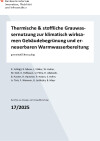
Entwicklung eines Systems zur stofflichen und thermisch-energietechnischen Grauwasserfiltratsverwertung zur Bewässerung von Gebäude- und Fassadenbegrünungen zur Reduktion des Energieverbrauchs der Warmwasserbereitstellung und des Wasserverbrauchs von Begrünungssystemen.
Schriftenreihe
17/2025
K. Schlögl, R. Mixan, J. Völker, W. Huber, M. Gräf, K. Hofbauer, U. Pitha, R. Allabashi, B. Pucher, R. Hammer, P. Holzer, S. Hofer, A. Türk, F. Wimmer, G. Jedliczka, B. Mayr Berichte aus
Herausgeber: BMIMI
Deutsch, 112 Seiten
Downloads zur Publikation
Monitoring of multi-family houses “Tonpfeifengasse”
Evaluation of activated building parts as heat storage for renewable energy shown on the example of the multi-family houses "Tonpfeifengasse".
Langzeitevaluierung des Energieverbrauchs von 100 energieeffizienten Gebäuden in Österreich als repräsentativer Querschnitt österreichischer Leuchtturmobjekte (LZE 100 Leuchtturmobjekte)
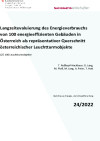
Erfassung, Auswertung und Analyse von Energieverbrauchsdaten von 100 energieeffizienten Gebäuden in Österreich über eine Betriebszeit von 3 bis 25 Jahren als repräsentativer Querschnitt der österreichischen Leuchtturmobjekte. Differenzierung nach Gebäudetypen, Energieträger und Ermittlung der realen Treibhausgas-Emissionen. Vergleich der gemessenen Verbräuche zu Benchmark-Werten.
Schriftenreihe
24/2022
T. Roßkopf-Nachbaur, G. Lang, M. Ploß, M. Lang, A. Peter, T. Hatt
Herausgeber: BMK
Deutsch, 143 Seiten
Downloads zur Publikation
Energiemosaik Austria - Österreichweite Modellierung und webbasierte Visualisierung von Energieverbrauch und CO2-Emissionen auf Gemeindeebene
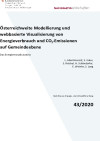
Inhalt des Projektes ist eine alle Nutzungs- und Mobilitätsarten umfassende Modellierung und webbasierte Visualisierung von Energieverbrauch und Treibhausgasemissionen aller österreichischen Gemeinden. Die Ergebnisse können in zahlreiche energie- und klimarelevante Handlungsfelder integriert und für die Sensibilisierung von Entscheidungsträgern und Öffentlichkeit genutzt werden.
Schriftenreihe
43/2020
L. Abart-Heriszt, S. Erker, S. Reichel, H. Schöndorfer, E. Weinke, S. Lang
Herausgeber: BMK
Deutsch, 56 Seiten
Downloads zur Publikation
Die CO2 neutrale Baustelle - Ein Beitrag zum Klimaschutz der österreichischen Bauwirtschaft
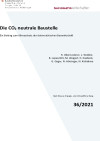
Identifikation aller auf Baustellen anfallenden direkten und indirekten CO2- bzw. THG-Emissionen. Analyse der Rahmenbedingungen und Technologien, um Möglichkeiten für deren Steuerung aufzuzeigen. Gleichzeitig wurden Mehrwerte wie beispielsweise Kosten- und Nutzen-Vorteile einer CO2-neutralen Baustelle aufgezeigt und quantifiziert.
Schriftenreihe
36/2021
R. Obernosterer, L. Winkler, B. Lepuschitz, M. Weigert, H. Daxbeck, G. Goger, N. Hörzinger, N. Kisliakova
Herausgeber: BMK
Deutsch, 119 Seiten
Downloads zur Publikation
Urban district heating extended - Flexibilisierung und Dekarbonisierung urbaner Fernwärmesysteme
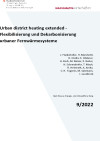
Entwicklung innovativer urbaner Fernwärmeversorgungssysteme durch Integration von Langzeitwärmespeicher, (Groß-)Wärmepumpe, solarthermische Großanlage, Abwärme und simulationstechnischer Analyse und Bewertung. Das Ergebnis dient als Vorbild für Technologieauswahl und Einsatzreihenfolge neuer urbaner Fernwärmeversorgungsgebiete.
Schriftenreihe
9/2022
J. Fladenhofer, H. Marchetti, H. Ondra, E. Höckner, H. Koch, M. Moser, P. Reiter, H. Schranzhofer, T. Mach, R. Heimrath, A. Arnitz, C. R. Tugores, M. Salzmann, I. Leusbrock
Herausgeber: BMK
Deutsch, 176 Seiten
Downloads zur Publikation
Ergebnisband „Urban Data Management“
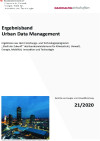
Der vorliegende Ergebnisband stellt abgeschlossene Projekte aus dem Forschungs- und Technologieprogramm „Stadt der Zukunft“ des Bundesministeriums für Klimaschutz, Umwelt, Energie, Mobilität, Innovation und Technologie (BMK) im Bereich Urban Data Management vor. Die gewonnenen Erkenntnisse sollen eine Entwicklung in Richtung energieeffiziente und klimaverträgliche Stadt unterstützen, die auch dazu beiträgt, die Lebensqualität und die wirtschaftliche Standortattraktivität zu erhöhen.
Schriftenreihe
21/2020
Redaktionelle Gestaltung: Bianca Pfefferer, Hannes Warmuth (ÖGUT)
Herausgeber: BMK
Deutsch, 24 Seiten
